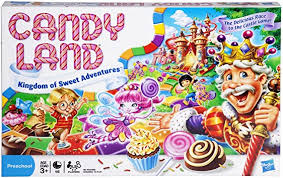
An inspiring post over at thewritepractice.com has me thinking about ways to keep fiction stories moving. We all hear, “Every scene must move the story forward.” For me, that command conjures up visions of the kid’s board game Candy Land.
Writing Tip for Today: How do your story’s scene goals relate to a game of Candy Land?
Win, Draw or Lose a Turn
Since I have grandchildren who love to play this timeless game, I can attest that you can draw cards (scenes) which jump you ahead, move you one square or send you back to Start. It’s actually similar to how readers experience a good story: they are kept off-balance because they never know if the next scene will let the protagonist jump ahead in his/her goal quest or set that character back.
And like my sweet four-year-old granddaughter, who doesn’t quite understand the cards should randomly shuffled, you as the writer must know the goal for every scene and for every character in the scene. Like my granddaughter, you control which card comes up next, so your characters either win or lose the goal for that scene.
By setting these scenic or intermediate goals, you show readers how near or far the characters are from attaining the overall story goal. For instance, let’s say your overall goal for your protagonist is romance. In every scene, you move the character back and forth in smaller goals that will accumulate over the story’s course. So the girl who wants the guy will, in every scene, find out more about the guy—for good or not so good.
Gummy Bear Goals
When you write a scene, you probably have at least some inkling of what your Main Character hopes to win in that scene. But what about the other players? If you fail to give secondary characters their own goals, you may end up with a deus ex machina situation. The “gods” or the calvary rides in to save the day, but they really haven’t shown readers their goals or why they’d come to the rescue. So it feels contrived.
But if these secondary characters have goals too (most opposing the Main Character), readers will be more apt to see them as an integral part of the story, not just tacked on. If you allow coincidences to dominate your story, it will quickly become unbelievable. Sometimes, life events do feel coincidental. But in fiction, everything must make logical sense.
This is one reason why in memoir writing, the big out-of-the-blue events often don’t make as big a splash as the writer hopes. Readers want to see a character with a goal trying to go for that goal and others opposing the goal. My writing students who wanted to chronicle their big car accident were often disappointed by how little impact the event had in writing. Without a logical progression of goal—opposition—win/lose, readers struggle to find meaning.
Game Winner
In order to win at Candy Land, your readers need to get to the King’s Castle, where chocolate fountains flow and every sweet thing is yours. Readers, likewise, want to be satisfied by story’s end, but they want to earn their satisfaction. Make the story goals too easy and nobody wins (or cares).
If the scene goals have kept readers on edge, wondering what happens next, the writer has done a good job. One way to keep track of all these intermediate or micro goals is to create some kind of storyboard or spreadsheet. Spend time writing out secondary characters’ goals in the scene as well as the Main character. You may change the goals as you polish, but at least keep placeholder goals as you draft.
After you give a character a goal for a scene, ask, “Why?” Why does this character need (not want or wish) to win this goal? The answer will help you raise the stakes and tension as you write toward the overall story goal. Don’t let your scenes suffer from randomness. Instead, take a hint from my granddaughter and decide in advance which card/scene goal your character draws.




